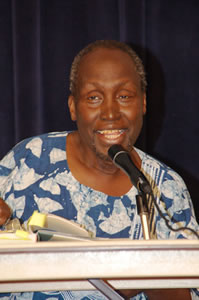De Italiaanse schrijver Umberto Eco werd geboren op 5 januari 1932 in Allasandria. Zie ook mijn blog van 5 januari 2007.
Uit: The Mysterious Flame of Queen Loana (Vertaald door Geoffrey Brock)
“1. The Cruelest Month
“And what’s your name?”
“Wait, it’s on the tip of my tongue.”
That is how it all began.
I felt as if I had awoke from a long sleep, and yet I was still suspended in a milky gray. Or else I was not awake, but dreaming. It was a strange dream, void of images, crowded with sounds. As if I could not see, but could hear voices that were telling me what I should have been seeing. And they were telling me that I could not see anything yet, only a haziness along the canals where the landscape dissolved. Bruges, I said to myself, I was in Bruges. Had I ever been to Bruges the Dead? Where fog hovers between the towers like incense dreaming? A gray city, sad as a tombstone with chrysanthemums, where mist hangs over the fa¦ades like tapestries…
My soul was wiping the streetcar windows so it could drown in the moving fog of the headlamps. Fog, my uncontaminated sister…A thick, opaque fog, which enveloped the noises and called up shapeless phantoms…Finally I came to a vast chasm and could see a colossal figure, wrapped in a shroud, its face the immaculate whiteness of snow. My name is Arthur Gordon Pym.
I was chewing fog. Phantoms were passing, brushing me, melting. Distant bulbs glimmered like will-o’-the-wisps in a graveyard…
Someone is walking by my side, noiselessly, as if in bare feet, walking without heels, without shoes, without sandals. A patch of fog grazes my cheek, a band of drunks is shouting down there, down by the ferry. The ferry? It is not me talking, it is the voices.
The fog comes on little cat feet…There was a fog that seemed to have taken the world away.”

Umberto Eco (Allasandria, 5 januari 1932)
De Zwitserse schrijver Friedrich Dürrenmatt werd geboren op 5 januari 1921 in Konolfingen. Zie ook mijn blog van 5 januari 2007.
Uit: Pilatus
“Der Gott war nicht von großem Wuchs, und seine Gestalt war die eines unscheinbaren Menschen. Die Hände waren nach vorne gebunden und blau aufgetrieben. Die Kleider lagen ihm zerfetzt und schmutzig am Leib, so dass an vielen Stellen die Haut zu sehen war, über die rote Striemen liefen.
Er sah, daß diese Gestalt des Gottes die grausamste war, die den Menschen täuschen konnte, und daß es dem Gott nur in einem unvorstellbaren Hass hatte einfallen könne, in dieser niedrigen Maske zu erscheinen.”

Friedrich Dürrenmatt (5 januari 1921 – 14 december 1990)
De Keniase schrijver Ngũgĩ wa Thiong’o werd geboren op 5 januari 1938 in Kamiriithu, Limuru, Kenia. Zie ook mijn blog van 5 januari 2007.
Uit: Wizard of the Crow
“There were many theories about the strange illness of the second Ruler of the Free Republic of Aburiria, but the most frequent on people’s lips were five.
The illness, so claimed the first, was born of anger that once welled up inside him; and he was so conscious of the danger it posed to his well-being that he tried all he could to rid himself of it by belching after every meal, sometimes counting from one to ten, and other times chanting ka ke ki ko ku aloud. Why these particular syllables, nobody could tell. Still, they conceded that the Ruler had a point. Just as offensive gases of the constipated need to be expelled, thus easing the burden on the tummy, anger in a person also needs a way out to ease the burden on the heart. This Ruler’s anger, however, would not go away, and it continued simmering inside till it consumed his heart. This is believed to be the source of the Aburirian saying that ire is more corrosive than fire, for it once eroded the soul of a Ruler.
But when did this anger take root? When snakes first appeared on the national scene? When water in the bowels of the earth turned bitter? Or when he visited America and failed to land an interview with Global Network News on its famous program Meet the Global Mighty? It is said that when he was told that he could not be granted even a minute on the air, he could hardly believe his ears or even understand what they were talking about, knowing that in his country he was always on TV; his every moment–eating, shitting, sneezing, or blowing his nose–captured on camera. Even his yawns were news because, whether triggered by boredom, fatigue, hunger, or thirst, they were often followed by some national drama: his enemies were lashed in the public square with a sjambok, whole villages were blown to bits or people were pierced to death by a bows-and-arrows squad, their carcasses left in the open as food for hyenas and vultures.”

Ngũgĩ wa Thiong’o (Kamiriithu, 5 januari 1938)
Zie voor onderstaande schrijver ook mijn blog van 5 januari 2007.
De Russische schrijver Yevgeni Anatoljewitsj Popov werd geboren op 5 januari 1946 in Krasnojarsk, Sibirië.
